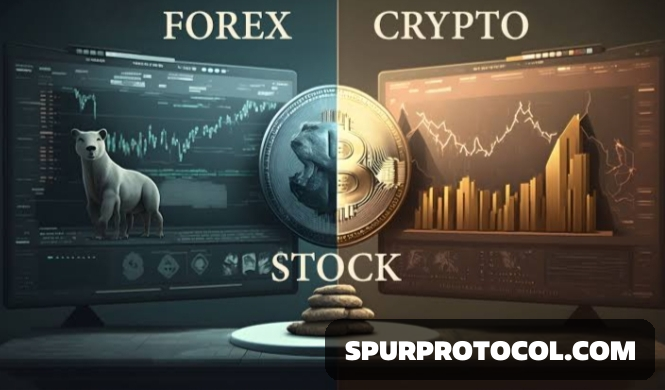Crypto Market VS Forex Market
Forex runs 24/5, while crypto markets run 24/7. Forex is heavily regulated, while crypto regulations are widely different by jurisdiction. The two markets also diverge in terms of price.
Go Back

🕒 4:59 PM
📅 Jan 24, 2025
✍️ By Raj38
What is Forex Market
The forex (foreign exchange) market is the world's most liquid financial market, enabling the trade in pairs of national fiat currencies, such as the U.S. dollar (USD), euro (EUR), Canadian dollar (CAD), Singapore dollar (SGD), Swedish krona (SEK), Japanese yen (JPY) and many more. Trades and positions on the forex market are all expressed in pairs of currencies (e.g., USD/EUR), with the first ticker called the base currency and the second one called the quote currency. A forex pair price indicates how much of the quote currency you need to pay to buy one unit of the base currency. For instance, a listing of USD/EUR 0.9 means that to buy one U.S. dollar, you'd need to pay 90 Euro cents.
Examples
Euro and U.S. dollar: EUR/USD
U.S. dollar and Japanese yen: USD/JPY
British pound and U.S. dollar: GBP/USD
U.S. dollar and Swiss franc: USD/CHF
Australian dollar and U.S. dollar: AUD/USD
U.S. dollar and Canadian dollar: USD/CAD
New Zealand dollar and U.S. dollar: NZD/USD

What is Crypto Markets
Crypto markets are characterized by high volatility, which presents both improved return opportunities and increased risks. The world's highest-capped cryptocurrency,Bitcoin (BTC), holds more than half (around 54%) of the entire crypto market capitalization as of Oct 22, 2024. It's also the second-most-traded crypto asset [behind the Tether (USDT) stablecoin] by daily trading volume. Other popular high-cap and actively traded cryptocurrencies include Ethereum (ETH), Solana (SOL), BNB (BNB), XRP (XRP) and the USD Coin (USDC) stablecoin.
Differences Between Forex and Crypto Trading

Asset Nature
There's a fundamental difference in the nature of assets traded in these two markets. Forex trading involves fiat currencies issued by governments and guaranteed by them. Crypto trading involves digital currencies whose issuance, operations and value are ensured through the functionality of blockchain networks or blockchain-based decentralized apps (DApps). In a practical sense, the viability of crypto trade is also highly dependent upon the operational health and reserves maintained by the leading crypto exchanges.
Regulation
While forex is known to be less regulated than the stock market, forex brokers and other entities participating in the forex market still need to meet a variety of qualification requirements. For instance, in the U,S,, brokers need to be registered with the Commodity Futures Trading Commission (CFTC), and to fulfill other requirements.
